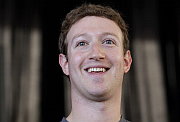E-G8 Summit: Tighten the Nuts?
The main topic of the summit is Internet regulation
For those who are not at all interested in politics and do not watch zombies, a brief reference: tomorrow and the day after tomorrow, May 26-27, France will host the annual
 summit of the G8 heads of states, abbreviated G8 . And here is IT, you ask. Apparently, French President Nicolas Sarkozy asked the same question. And he decided to make IT “moreover,” namely, to gather before the G8 summit the heads of the most influential Internet and IT companies in general from the countries of this G8. He succeeded and a meeting with the code designation e-G8 takes place in Paris yesterday and today, that is, right now.
summit of the G8 heads of states, abbreviated G8 . And here is IT, you ask. Apparently, French President Nicolas Sarkozy asked the same question. And he decided to make IT “moreover,” namely, to gather before the G8 summit the heads of the most influential Internet and IT companies in general from the countries of this G8. He succeeded and a meeting with the code designation e-G8 takes place in Paris yesterday and today, that is, right now. Who did Sarkozy invite to this e-summit? The list is really impressive. Here are just a few well-known names:
- Eric Schmidt , Google
- Mark Zuckerberg , Facebook
- Craig Mandy , Microsoft
- Jimmy Wales , Wikipedia (we all know him well in person, right? :)
- Andrew Mason , Groupon
- John Donahue , eBay
- Jeffrey Basos , Amazon
- Lawrence Lessig , Creative Commons (and in between, professor at Harvard Law School)
- Iron manufacturers : HP, Huawei, HTC, Qualcomm, Alcatel-Lucent;
- Telecoms : France Telecom - Orange, Telecom Italia, Eutelsat Communications, etc .;
- media corporations, content generators and other copyright holders : Vivendi, Universal Music France, BBC, News Corporation (represented by Rupert Murdoch, New York Times, Wired, Financial Times and others;
- French and European ministers and other officials ;
- Svetlana Mironyuk , RIA Novosti (chief editor)
- Yuri Milner , Digital Sky Technologies (general director and co-owner, DST owns Mail.ru, partially Odnoklassniki, Vkontakte, QIWI and Facebook)
Who has already managed to speak
Nicolas Sarkozy
The main thesis
 that he was trying to convey to the audience was the need to regulate the Internet through both states and corporations. At first, he (as I understood from quotes in various media) praised Twitter and Facebook for their role in the outcome of the Arab revolutions, saying that helping people to express their will against regimes that had discredited themselves was good and right. And then I went on to the fact that uncontrolled use of the Internet is no longer possible, and states and corporations cannot remain neutral towards it. How Mr. Sarkozy fits in with one another, I have no idea. He pressed, of course, on copyright protection, the fight against cybercrime, protecting children from pornography and other Internet horrors.
that he was trying to convey to the audience was the need to regulate the Internet through both states and corporations. At first, he (as I understood from quotes in various media) praised Twitter and Facebook for their role in the outcome of the Arab revolutions, saying that helping people to express their will against regimes that had discredited themselves was good and right. And then I went on to the fact that uncontrolled use of the Internet is no longer possible, and states and corporations cannot remain neutral towards it. How Mr. Sarkozy fits in with one another, I have no idea. He pressed, of course, on copyright protection, the fight against cybercrime, protecting children from pornography and other Internet horrors. Quotes
The world that you represent here is not a “parallel universe” where legal and moral rules do not apply, and moreover, the basic rules of society in democratic countries.
Do not allow the revolution that you (the technological) began to threaten everyone’s fundamental right to privacy and complete autonomy.
Full transparency ... sooner or later will be one of the basic principles of individual freedom.
Eric Schmidt
Willy-nilly,
 he had to answer Sarkozy's theses. Schmidt said that technologies are developing so rapidly that governments should not try to “regulate” them, as they will change very quickly, and any problem that arises will be resolved technologically. “We are moving much faster than any government . ” It sounds a little defiant if we mean Google. As a hint, that simply cannot be regulated.
he had to answer Sarkozy's theses. Schmidt said that technologies are developing so rapidly that governments should not try to “regulate” them, as they will change very quickly, and any problem that arises will be resolved technologically. “We are moving much faster than any government . ” It sounds a little defiant if we mean Google. As a hint, that simply cannot be regulated. Schmidt also noted that the development of technology has led to a kind of “ shift of power ” from governments to individuals. This shift can manifest itself in a variety of ways, whether it is the publication of classified documents, the distribution of copyrighted content, or an organized uprising against a repressive regime.
More quotes:
In my personal opinion, most governments are experiencing problems due to this “shift”. And instead of complaining about what everyone is doing now, why don't we think about how to tame and use it?
You need to be careful in trying to regulate new, innovative industries. Obviously, some level of regulation is necessary to protect against all kinds of misfortunes. But I would be very careful not to “overshoot” the Internet.
Svetlana Mironyuk
The chief editor of
 RIA Novosti noted that the rapid development of communications, the transformation of traditional media due to changes in audience preferences and its departure to social networks require the creation of new business models in the media field, and this, obviously, will require a review of copyright law. According to her, RIA Novosti, being not only one of the largest national producers of content, but also the owner of a significant archive from the Soviet era, is extremely interested in unifying approaches and procedures in the field of copyright.
RIA Novosti noted that the rapid development of communications, the transformation of traditional media due to changes in audience preferences and its departure to social networks require the creation of new business models in the media field, and this, obviously, will require a review of copyright law. According to her, RIA Novosti, being not only one of the largest national producers of content, but also the owner of a significant archive from the Soviet era, is extremely interested in unifying approaches and procedures in the field of copyright.Now we see that the current copyright model slows down the process of information exchange, makes it difficult for consumers to access information, limits the growing social responsibility of the media to society and often does not correspond to the interests of the authors themselves.
The processes of information exchange, having become cross-border, require all of us to quickly respond to existing challenges, and not at the national, but at the international level.
John Perry Barlow
John Perry Barlow is one of the founders and activists of the Electronic Frontier Foundation ( EFF ), an American human rights organization that specializes in the protection of civil liberties and privacy on the Internet. As well as the author of the texts of the group Grateful Dead . He accepted the invitation to the summit at the last moment (although he was discouraged), therefore, in the list of participants at the. the site does not appear. As he tweeted , he felt himself entering the lion's den. At a meeting on intellectual property, he first listened and tweeted quotes.
We do not believe that it is possible to remove “content” from the Internet. If you do, what will remain there? The Internet will be basically an empty set of boxes and wires. (Hartmut Ostrowski, CEO of Bertelsmann, a German media company)
When someone comes to you and says: “I need a couple of hundred million dollars to make a film about three-meter blue people from another planet”, this is not an easy decision for you. But if you still accepted it and the result was an Avatar, then you still want some compensation. (20th Century Fox)
In France, some people continue to criticize him (referring to HADOPI and its three-step procedure for disconnecting from the Internet ), considering it to be a repressive body. In fact, it only gives a certain impulse from a pedagogical point of view. (Frederic Mitterrand, Minister of Culture and Communications of France)
When Barlow himself received the floor, he expressed great surprise at his presence here, "because I myself seem to be from a completely different planet."
I may be one of the few here who truly lives their lives in creating what respected gentlemen have called “intellectual property”. I do not consider self-expression as a form of ownership. Property is something that can be taken from me. Either I own it, or someone else.According to Barlow, the e-G8 forum aims to “adopt as standards of the future certain business practices and authorities taken from another era, not considering whether they will be productive, whether they will give new ideas or not.” He added that it would be more interesting for him to discuss how to “stimulate the creativity of people who really create something, and not some huge structures that have been living at the expense of the first many years.”
Self-expression does not look like this at all. The point of view that self-expression is the same, is entirely a consequence of the need to “collect” this self-expression and move it somewhere. This need was before the Internet appeared, and now it is possible to do it endlessly and practically at no cost.
To his surprise, his performance pleased part of the audience. And naturally it caused attacks from the owners. I am reluctant to translate them, all theses are known there.
Mark Zuckerberg
Transparency makes it possible
 to win the very best, such as the best restaurants, he said. Now, with the help of the Internet, it is possible to gather people's opinions, and the best things go up. It creates a more honest ecosystem ... I hope this leads to even better products.
to win the very best, such as the best restaurants, he said. Now, with the help of the Internet, it is possible to gather people's opinions, and the best things go up. It creates a more honest ecosystem ... I hope this leads to even better products. He further extended this approach to films. Despite the fact that films are advertised through Facebook, spending a lot of money, no amount of them can resist the bad reviews that spread themselves, in a viral way. When a movie is released, people already know if it’s good or bad, and selling bad films becomes more difficult. And this is good, he concludes.
The tendency that people get more and more opportunities to share what they want will become a trend for the next five to ten years. We are much closer to the beginning of this. We are looking for more ways for people to continue to share theirs.
He also said that of course he would like to see how his company helps those companies that distribute music and other entertainment to do this. But Facebook itself will not be able to create the technologies necessary for this. Facebook is just a platform, he explained.
Here come understand what he had in mind. Either he tried to weigh “both yours and ours” and did not offend anyone, or he openly advertised Facebook to the public.
When asked if Facebook was going to enter an IPO, Mark briefly answered: “Not yet.” Interestingly, this morning, before the start of the summit, Zuckerberg had a personal meeting with N. Sarkozy.
Other topics
Telecoms do not just participate in the summit, but with their own interest. The problem was voiced by Alcatel-Lucent Director of External Relations Gabrielle Gauthe. The spread and use of the Internet continues to grow, in the case of mobile Internet, it is simply explosive. The growth of traffic naturally requires operators to invest in the expansion and modernization of networks. And here the question arises of a fair distribution of value addedbetween the generators of this traffic and access operators. In the understanding of telecoms, such companies and services as Apple (iTunes), Google (Youtube), Facebook, etc. are the so-called. OTT operators (over-the top) operating the access network. So, roughly speaking, “it is necessary to share.” Now, all the profit from this traffic (sometimes occupying up to 30-40% of the network capacity), all laurels and all investments go to Internet companies, not to operators. Particularly difficult situation in the mobile segment. Now in European mobile networks, data traffic can account for 80% of the total, and voice traffic is only 20%. And this traffic is very poorly monetized.
Alcatel-Lucent CEO Ben Verwein even asked Eric Schmidt if Google plans to completely push telecoms off the stage, leaving them with the role of some kind of Internet plumbers quietly serving their pipes (such forecasts have already been made). Schmidt replied that of course not. That demand for extra. services on mobile networks, which creates Google and others, in fact, is a growth factor for telecoms. The emerging ecosystem is beneficial to all parties. "We are incredibly interdependent."
What's next
According to the organizers' idea, at the end of the forum, participants should accept several key points and proposals that will be presented and considered at the “main” G8 summit starting tomorrow. Why some of the delegates will go along with the theses to Deauville.
Video speeches can be seen here .
As news becomes available, I will try to supplement the article with quotes from the speeches of other participants. And you help links. It is interesting, for example, what Milner and Lessig say.
PS Thanks to the kind habra-people for unexpected help in publishing this article :)
